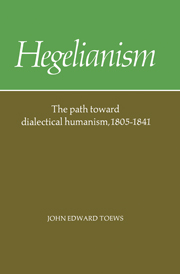Book contents
- Frontmatter
- Contents
- Preface
- Introduction: the Hegelian project in ideological perspective
- PART I PHILOSOPHY AND CULTURAL INTEGRATION: HEGEL IN CONTEXT
- 1 The origins of the Hegelian project: tensions in the father's world
- 2 Revolution and Romanticism: the generational context of Hegel's ideology of cultural integration
- 3 The reconciliation of Reason and reality: Hegel's differentiation from Romanticism
- PART II THE HISTORICAL APPROPRIATION OF THE ABSOLUTE: UNITY AND DIVERSITY IN THE HEGELIAN SCHOOL, 1805–1831
- PART III THE REDUCTION OF THE ABSOLUTE TO “MAN”: THE DIVISION OF THE SCHOOL AND THE EMERGENCE OF THE HEGELIAN LEFT, 1830–1841
- EPILOGUE: BEYOND “MAN” – THE RISE AND FALL OF LEFT HEGELIAN HUMANISM
- Notes
- Bibliography
- Index
3 - The reconciliation of Reason and reality: Hegel's differentiation from Romanticism
Published online by Cambridge University Press: 08 January 2010
- Frontmatter
- Contents
- Preface
- Introduction: the Hegelian project in ideological perspective
- PART I PHILOSOPHY AND CULTURAL INTEGRATION: HEGEL IN CONTEXT
- 1 The origins of the Hegelian project: tensions in the father's world
- 2 Revolution and Romanticism: the generational context of Hegel's ideology of cultural integration
- 3 The reconciliation of Reason and reality: Hegel's differentiation from Romanticism
- PART II THE HISTORICAL APPROPRIATION OF THE ABSOLUTE: UNITY AND DIVERSITY IN THE HEGELIAN SCHOOL, 1805–1831
- PART III THE REDUCTION OF THE ABSOLUTE TO “MAN”: THE DIVISION OF THE SCHOOL AND THE EMERGENCE OF THE HEGELIAN LEFT, 1830–1841
- EPILOGUE: BEYOND “MAN” – THE RISE AND FALL OF LEFT HEGELIAN HUMANISM
- Notes
- Bibliography
- Index
Summary
Although the ideology of cultural renovation formulated by the Romantic generation at the turn of the century articulated a vision of the identity of the ideal and real, nature and mind, being and becoming, the absolute and the concrete determinations of nature and history, it could still be described as “abstract” or “ideal” in relation to the prevailing historical actuality of social and cultural fragmentation. This chapter focuses on the evolving relationship of the Romantic vision of absolute identity to the historical changes that occurred in Germany under the impact of Napoleonic conquest and occupation, the wars of liberation, and the consolidation of a post-Napoleonic order (the “Restoration”) after 1815. As individual members of the Romantic generation tried to connect their vision of eschatological fulfillment to the changing historical actuality after 1800, that vision itself underwent a process of revision and differentiation. In terms of the theme of this study the developments that culminated in the opposing cultural stances of Hegel and the Historical School during the 1820s are of particular significance. For purposes of historical perspective, however, these positions should be viewed within the broader spectrum of the various responses of the Romantic generation to historical developments after 1800.
Two general distinctions may help to clarify the differentiation in patterns of response.
- Type
- Chapter
- Information
- HegelianismThe Path Toward Dialectical Humanism, 1805–1841, pp. 49 - 68Publisher: Cambridge University PressPrint publication year: 1981

